Evernote backtracks on privacy policy change after user revolt


(Image: file photo)
Evernote is walking back proposed changes to its privacy policy, which would have allowed its employees to read users' private notes.
The company said in a blog post late Thursday that it will not implement the changes, calling the proposed new policy a "misstep."
"We messed up," said Greg Chiemingo, who runs communications at Evernote.
Instead, the company "will be revising our existing privacy policy to address our customers' concerns, reinforce that their data remains private by default, and confirm the trust they have placed in Evernote is well founded."
Don't like Evernote's new privacy policy? Here are five free alternatives
The controversy began earlier this week when news broke that Evernote's privacy policy would change in an effort to improve its machine learning processes. In order to do that, the company said it would allow a small number of vetted staff to read user content to ensure the technology is working properly.
But that plan is now a no-go, said Chiemingo.
"No employees will be reading note content as part of this process unless users opt in," he said in the blog post.
The new privacy policy, which would have come into play in late January, was essentially mandatory. Users had the limited choice between opting-out for privacy, but with a worse service, or accepting the terms and allowing employees to read their notes.
"We are excited about what we can offer Evernote customers thanks to the use of machine learning, but we must ask for permission, not assume we have it. We're sorry we disappointed our customers, and we are reviewing our entire privacy policy because of this," said Chiemingo.
When reached, a spokesperson would not say how many people bolted from the service during the period that the privacy policy was floated.